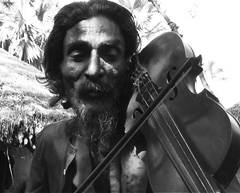Bishar Blues
 INDIA / 2006 / Bengali / Color / Video / 80 min
INDIA / 2006 / Bengali / Color / Video / 80 min
Director, Producer: Amitabh Chakraborty
Photography: Somak Mukherjee
Editing: Amitabh Chakraborty, Amit Debnath
Sound: Partha Barman
Research: Surojit Sen
Source: Amitabh Chakraborty
Fakirs, or ascetic monks, in the Bengal region of east India practice their own version of Islam. The songs of these fakirs, who are also minstrels, reveal their living faith. Their songs originally traveled through central Asia to Bengal, featuring violins, percussion, whistles, and heart-rending vocals, and educate people that “to know oneself is to know God.” This road movie captures a journey to meet these unusual Muslim faithful, fakirs who strive to spread their unique Islamic beliefs in a multicultural country while playing the bishar blues and practicing Marfat.
[Director’s Statement] Today as I look around at my global environment, I feel suffocated by the images of Islam that bombard me—the 9/11 New York Twin Tower bombings, the Afghanistan bombings, the Iraq bombings, the 7/7 London bombings, the bombings in Mumbai, Osama Bin Laden, undemocratic rigid theologians . . . Where is the human individual who practices a simple faith?
I bumped into the Bengali fakir in his own land and he made me think.
Bishar Blues travels across the West Bengal countryside on the trail of the Islamic fakir who walks the path of Marfat. In Islam the Sharia laws organize the physical world, ethics . . . The Marfat is the hidden knowledge, with the goal of freeing oneself from the physical via the ascetic way.
The fakirs all believe in Allah, the prophet Mohammed, and the Koran. But they each have their own interpretations of Allah, Mohammed, and the Koran, and also of the relationship between these three, creating a multi-textured mythology of Islam without the official sanction of any centralized authority. Every individual fakir gives his own twist to the tale. The variations are an endless yielding to the notion that Man himself is the ultimate mythology. Knowing oneself is knowing God.
In the fakirs I recognized the human individual as the supreme arbitrator of his own destiny. The system bends and veers along. Separate individuals create numerous variables and keep the system open-ended. The fakirs keep Islam open-ended. I threw in my lot with them. I made my film.
 Amitabh Chakraborty
Amitabh Chakraborty
Born in 1959 in India, Chakraborty holds a Bachelor of Arts in political science and a graduate degree in film editing from the Film and Television Institute of India in Pune. Chakraborty produced and directed the feature film, Kaal Abhirati (1990), which was awarded a Special Jury Award at the Indian National Film Awards in New Delhi. His other films include Kitsch-Mitsch (1996). He is currently directing and coproducing Cosmic Sex—A Dialogue with Gandhi. |
